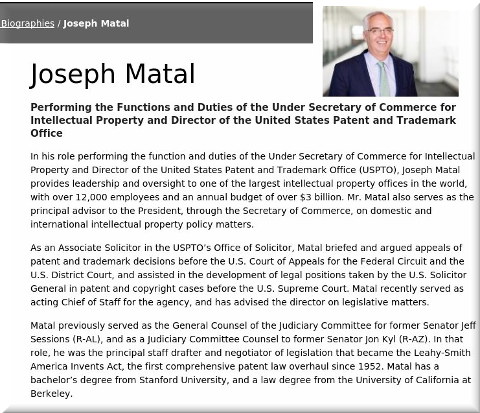

Source: Joseph Matal's official page
THE latest announcement from the USPTO, echoed by Patently-O a couple of days ago, suggests that the Office is trying to deal with those "who fail to comply with the USPTO’s standards for ethics and professionalism."
The Department of Commerce’s United States Patent and Trademark Office (USPTO) is initiating a two-year Diversion Pilot Program for patent and trademark practitioners. Implemented by the Office of Enrollment and Discipline (OED), the program aligns USPTO with the practices of more than 30 state attorney discipline systems. It will help OED accomplish its mission of protecting the public from practitioners who fail to comply with the USPTO’s standards for ethics and professionalism.
[...]
“We’re hopeful that this pilot program will align our agency with best practices established in other states while allowing practitioners a fair chance to rectify previous misconduct and allow them to move forward in a productive manner,” said Joseph Matal, Performing the Functions and Duties of the Under Secretary of Commerce for Intellectual Property and Director of the United States Patent and Trademark Office.
There’s much we still don’t know about how the US government will shape IP and antitrust in the next few years, but outside of the USPTO Director’s appointment — which, barring any accidents is due to be Andrei Iancu — Delrahim promises to have arguably the biggest impact on the IP community of any recruit to the Trump administration. The Obama White House set a far more activist tone when it came to the application of competition laws to IP, recommending, for instance, a change of approach for standard setting organisations which led to the IEEE introducing a new patent policy that several large SEP owners have refused to support.
That approach has led to some sharp criticism from some quarters. Earlier this year former FTC Commissioner Joshua Wright, who is now a law professor at George Mason University, told an IP industry event in Washington DC that: “It is my view that there is no more important area with respect to competition policy for the incoming administration than the intersection of IP and antitrust.” He went on to add: “In my view current antitrust IP policy at the DOJ and FTC is off the tracks.” To what extent Delrahim charts a new course for that policy will have significant implications for patent owners worldwide.